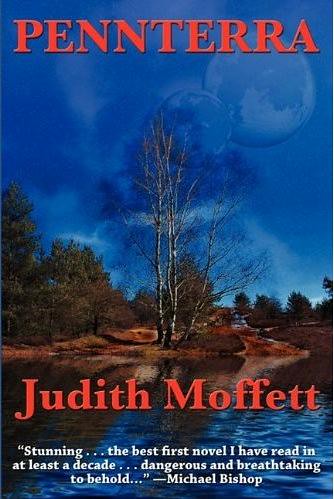After joining Warren Lapine's
Fantastic Books imprint as an acquisitions editor
1, a bit less than a year ago, the first book I acquired for reprint was
Judith Moffett's novel
Pennterra. This was her first novel and had been out of print since 1993. In an email to Warren on February 27, 2009, in which I introduced Judy (virtually speaking, that is) to him, I described her as follows:
...Judith Moffett is not your typical sf author! She is an award-winning poet with a PhD from the University of Pennsylvania, a couple of Fulbrights under her belt and grants from both the National Endowment for the Humanities and the National Endowment for the Arts. She is also a world-class translator of Swedish poetry, and presented at the 1998 Nobel Symposium on Translation of Poetry and Poetic Prose held in Stockholm.
Now I know that when Judy reads this, she'll be all "Aw, shucks," and the like, but how many science fiction, fantasy, horror, slipstream -- hell, even mainstream fiction -- authors do you know with this kind of street cred? Just check out all her awards and recognitions on
Wikipedia and then come back here and leave me a comment if you're not totally knocked out!

What influenced my decision to blog about Ms. Moffett and her fiction was a recent online review of
Pennterra. The review is by Sam Kelly on a blog entitled
Cold Iron and Rowan-Wood. But first, a bit about the novel itself: A group of Quakers colonize a planet -- Pennterra -- already inhabited by the alien
hrossa. In order to live in peace and harmony with both the planet and the natives, the colonists are restricted to a single valley, and they must limit their population and forsake all heavy machinery in their building and farming. Not exactly what they had in mind when they left a devastated Earth for a new home amongst the stars. Without the use of machinery, the colonists' days are completely filled with exhausting, backbreaking work, and consequently they have had little time to study the
hrossa -- until now. A small group of scientists are sent to live with, and study, the natives, and this is detailed in a large section of the novel through the use of field notes and personal journals; the
hrossa have a very interesting set of sexual mores, which has a direct impact on the scientists themselves (sorry, no spoilers here). There is a particularly fine "first contact/coming-of-age" story arc involving the son of one the scientists. The main conflict arises in the novel when another colony ship arrives on the planet and these folks are not so inclined to limit and forsake.
Now, what makes Sam Kelly's review of
Pennterra interesting is that he makes little mention of the aliens, but he does comment on the Quaker religion portrayed in the book: "Moffett does a good job of showing us how they find the nature of the planet out...making no distinctions between biological research, botanical studies, practical anthropology, and conversation between friends. At the same time, we see the characteristic painful Quaker honesty about themselves and their reactions to their work. The pacing of discovery is good, without playing I-know-something-you-don’t-know tricks on either reader or characters; it might have been good to have seen the author coming down less heavily on the Quaker side, but then I may well be seeing more of that than is there as a Quaker myself." [Note: I believe the reviewer is sensing more of the Quakerness of the story than a typical reader (myself) would.]
All of this, of course, is to encourage you to read
Pennterra. Judy and I spent approximately two weeks copyediting the page proofs, discussing each and every correction during very lengthy (two to three hours) telephone conversations. The Fantastic Books edition of
Pennterra is indeed the most accurate text of the novel and thus the author's preferred text. However, copies of earlier editions are available through secondary markets, or you can purchase the
Fantastic Books edition directly from the FB website, or via Amazon or other booksellers. (And yes, I'm shilling books here; what can I say...)
 During my one year as an acquiring editor for Fantastic Books, two of my acquired titles saw publication: Judith Moffett's long-out-of-print first novel Pennterra
During my one year as an acquiring editor for Fantastic Books, two of my acquired titles saw publication: Judith Moffett's long-out-of-print first novel Pennterra
